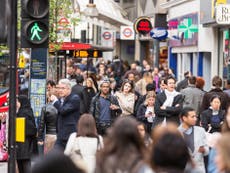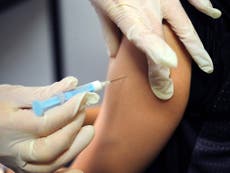T-cell immunity lasts 17 years in Sars virus, providing hopes for Covid herd immunity, research shows
T-cell research may provide answers to mysteries of Covid-19, Kate Ng reports

Public Health England has partnered with diagnostics company Oxford Immunotec to recruit thousands of people in an effort to find out if they have acquired T-cell immunity to Covid-19.
The new trial follows recent research that showed people infected with a Sars virus similar to Covid-19 developed T-cell immunity that can act up to 17 years, meaning far more people may be immune for a long period of time.
Previously, scientists had hoped that individuals infected with SARS-CoV-2, the virus that causes Covid-19, would develop antibodies that would prevent them from getting reinfected, but studies have suggested they vanish after a few months.
But experts are now re-focusing their attention on T-cell studies, which have provided more optimistic results. One such study, led by researchers at Duke-NUS Medical School in Singapore, found SARS-CoV-2 reactive T-cells in recovered SARS patients 17 years after infection.
“Our findings also raise the possibility that long-lasting T-cells generated after infection with related viruses may be able to protect against, or modify the pathology caused by, infection with SARS-CoV-2,” wrote researchers in their report, which was published in the research journal, Nature.
There are also a number of studies that have documented SARS-CoV-2 reactive T-cells in people who have had no known exposure to the virus, raising hopes among the medical community that more people have some immunity to Covid-19 than previously thought.
Peter Doshi, associate editor of the British Medical Journal (BMJ), wrote last week: “T-cell studies may also shed light on other mysteries of Covid-19, such as why children have been surprisingly spared the brunt of the pandemic, why it affects people so differently, and the high rate of asymptomatic infections in children and young adults.”
The partnership between PHE and Oxford Immunotec will evaluate whether its home testing kits, called the T-SPOT Discovery SARS-CoV-2 test, can adequately pick up T-cell immunity in a large-scale trial involving 3,500 healthcare workers and police officers.
There are hopes the trial could make immunity passports possible, which would allow people with the protective T-cells to safely return to the workplace. It comes as the government urges employees to work from home wherever possible to stem a surge in infections across the UK.
T-cells make up a part of the immune system that responds to chains of amino acids produced by different types of coronaviruses and may be responsible for stopping the virus in people who appear asymptomatic.
However, those T-cells die off in older people, which may explain why they are far more likely to develop serious illnesses.
The tests will be used to generate data to help governments plan future restrictions with a better understanding of population-wide immunity, roll out more comprehensive testing programmes and allow freer movement in the community or internationally, said Oxford Immunotec.
Peter Wrighton-Smith, CEO of Oxford Immunotec, said in a statement: “We are very pleased to be partnering with PHE and to be contributing to the UK’s efforts to find the best testing protocols to fight Covid-19.
“We have been able to employ our expertise in immunology and particularly the T-cell response to add value to these efforts. We believe a successful EDSAB-HOME trial will yield important information about our test, to further our knowledge of how it works and help us to develop the test further.”






Join our commenting forum
Join thought-provoking conversations, follow other Independent readers and see their replies
Comments